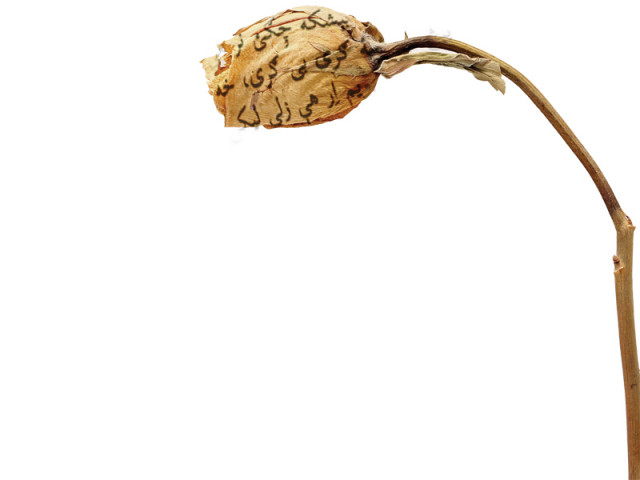Isolate language from the mountains of Waziristan faces extinction
Faced with the dominance of Pashto, Ormuri’s fate lies in its people and their return to the homeland.

Faced with the dominance of Pashto and threatened by the displacement of its native speakers due to war, Ormuri’s fate lies in its people and their return to the homeland. DESIGN: ESSA MALIK
Nestled amidst the rough terrain of South Waziristan, Kaniguram Valley has been inhabited for centuries by the Ormur people, also known as Burki. These hardened fighters are the sole caretakers of an endangered cultural heritage passed down from generation to generation.
Although the Ormur are frequently listed as a Pukhtun tribe, they form a distinct linguistic group in South Waziristan. Unfortunately, the Ormuri language has taken a serious blow from the displacement of Burki tribesmen following the military operations in South Waziristan in recent years.

While the federal government considers national status for several languages spoken across Khyber-Pakhtunkhwa (K-P) and Gilgit-Baltistan (G-B) – including Pashto, Hindko, Balti and Brushaski – another more isolate regional language is on the verge of extinction.
Teetering on the brink
Ormuri has stood the test of time and continues to be spoken by Ormurs in Kaniguram and smaller pockets of Logar province in Afghanistan. Despite being surrounded by Pukhtuns, almost all Kaniguram natives are bilingual in both Ormuri and the local Pashto Wazirwola dialect. However, the military operation in 2009, changed everything when the original population of roughly 10,000 Ormuri speakers experienced a mass exodus to urban centres across the provinces while a few have settled in Afghanistan.
The beautiful language of this hill tribe has found itself time and again as a battleground for extremism and militancy in recent history. It has frequently been the epicentre of conflict between the Pakistan Army and factions of the Tehreek-e-Taliban Pakistan, with a number of Ormurs hauled into the fight.
Members of the Burki community, including scholars, link the survival of Ormuri to the return of displaces Ormurs to the Kaniguram Valley. “The only way to save our language now is if Ormur families, who are living as displaced people across Pakistan, are sent back to Kaniguram,” says Irfan Burki, an Ormur now settled in Tank. “This way, they will come together and life will be breathed into Ormuri again.”
In the wake of ever-increasing radicalism and an exponential rise in terrorism, preserving cultural heritage has taken a back seat in Pakistan. And in the absence of a special protective status from the government, the Ormurs have been left to discover their own little ways in which to safeguard their language from annihilation.
Ormuri poets like Rozi Khan Burki, are all affiliated with the only literary society representing their language – Kaniguram Adabi Tolana. All members of the tolana are ethnic Ormurs and hold frequent mushairas in DI Khan and Tank.
“We are gravely worried about our language,” another Ormur, Wajid Burki added to The Express Tribune. “The language of our forefathers is dying in front of us and the unfortunate part is that hardly anyone is doing anything to prevent it.”
Linguistic lineage
Like most ethnicities of South-Central Asia, the origins of the Ormur and those of their language remain largely shrouded in ambiguity. The most commonly accepted theory is of their emergence from Yemen around a millennium ago, when they were taken in by Mahmud of Ghazni as mercenaries. Other folk tales, however, place them in their current domain since the time of the Greek invasions.
Legend has it that the word ‘Ormur’ is taken from the literal Pashto word meaning ‘fire extinguished’ – an honourific title given to them by Mahmud Ghaznavi after the taking of the Somnath Temple on the distant shores of Gujarat. Led by Burki fighters, Ghaznavi’s forces succeeded in sacking the shrine after the Ormurs managed to extinguish the protective fires lit around the temple.
“During his invasion of India, Mahmud was particularly pleased with the Burkis’ role in the famous battle of Somnath in Gujarat province,” says Imran Khan, whose mother is from the Ormur tribe, in his book, Warrior Race: A Journey Through the Land of the Tribal Pathans, “and, upon return, granted them the region now comprising South Waziristan.”
Perhaps the most famous Ormur is the 16th century Sufi poet Bayazid Ansari – better known as Pir Roshan. Credited with founding the Roshaniyya, a reformist and enlightenment movement, Pir Roshan wrote primarily in Pashto, Persian and Arabic and also authored the philosophical Pashto book, Khair-al-Bayan. The Ormur poet rallied numerous armies to fight against the Mughal emperor Akbar’s relentless incursions in the region.
Published in The Express Tribune, March 26th, 2014.













COMMENTS
Comments are moderated and generally will be posted if they are on-topic and not abusive.
For more information, please see our Comments FAQ